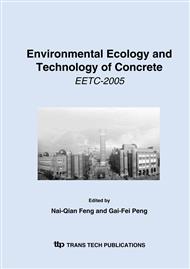p.363
p.371
p.376
p.384
p.391
p.398
p.405
p.411
p.418
A Study on Supercritical Water Technology for Recycling of Building Materials
Abstract:
Supercritical water (SCW) has both the solvent power approximate to liquids and the transport properties common to gases. It is therefore expected as an excellent solvent for industrial waste treatment. In this study, various building materials were treated with SCW, and their morphological changes after treatment were observed. The effects of SCW treatment on the pore structure and compressive strength of cement concrete and mortar were also investigated. In the range of this study, after SCW treatment, inorganic materials and organic materials can be recovered as solids and liquids, respectively. Under sub-critical and super-critical temperature and pressure conditions, compressive strength of mortar decreases, while the effective pore volume increases.
Info:
Periodical:
Pages:
391-397
Citation:
Online since:
January 2006
Authors:
Price:
Сopyright:
© 2006 Trans Tech Publications Ltd. All Rights Reserved
Share:
Citation:


